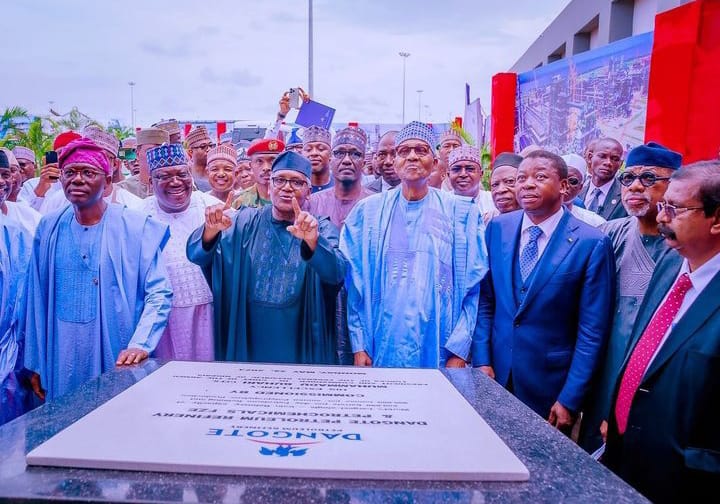President Muhammadu Buhari on Monday commissioned the $19bn Dangote refinery reputed as Africa’s largest oil refinery at an occasion attended by business leaders and five African Presidents.
Built by Africa’s richest man Aliko Dangote in the commercial hub of Lagos, the refinery, with the ability to process 650,000 barrels a day when at full capacity will begin operations in June.
The new facility, lying on 2,635 hectares (6,500 acres) of land at the Lekki Free Zone and costing an estimated $19bn according to local media, could be a game changer.
The refinery, which was first scheduled to open in 2021, will “stop the drainage of foreign exchange” and “create massive employment,” a senior manager with Dangote who did not want to be named told AFP.
He said the project will “meet the entire requirements of Nigerians,” and serve needs around the world.
“We have (the) capacity to export the products to any part of the world. We have two vessels to bring in the crude, three vessels to export it to any part of the world,” he said.
Some 1,100-kilometre (about 680 miles) of subsea pipelines have been laid to link the oil-rich Niger Delta to the complex.
The pipelines are also expected to create a corridor for the evacuation of trapped gas from offshore platforms and allow for the monetisation of the product.
Also on the massive complex is a $2 billion fertiliser plant with a three million tonnes per annum capacity.
“I’m glad to say that this project comes with numerous economic benefits to Nigerians as in the first instance, it will generate 1000s of direct jobs of over 135,000 permanent jobs. Says Godwin Emefiele, the Governor of Nigeria;s Central Bank.
According to Emefiele, the project is interior with significant savings in terms of foreign exchange and in easing the fiscal body of the federal government available data.
He said that it will also save Nigeria $25b and $30b forex annually and give the economy an inflow of $10b yearly.
Lagos State governor, Babajide Sanwo-Olu said that Dangote came to Lagos with nothing 45 years ago but has now built the biggest empire in the world for Africa.
“Dangote came to Lagos with nothing about 45 years ago, but he is now Africa’s richest man,” Sanwo-Olu jocularly said in his speech.
He added that Dangote, who came to Lagos from Kano had nothing 45 years ago but now, he has set up an empire in Nigeria to make Africa proud.
He said, “The first story is about a young Nigerian 45 years ago and you see the coincidence in the story. 45 years ago, who came to Lagos, all the way from another mega-city, Kano, who saw the prosperity, the diversity of our country, who came with nothing but in 45 years has built the biggest empire in the world for Africa.”
He described Dangote as a detribalised man who saw the wealth of the state, adding that the highly successful businessman is a Lagosian who has invested in the prosperity of the state and Nigeria.
In his remarks, the chairman and CEO of the Dangote Group, Alhaji Aliko Dangote, said his first goal is to ramp up production of the various products to ensure that within this year, they are able to fully satisfy the nation’s demand for quality products.
“There will be constant availability of high-quality fuels for our transportation sector, the refinery will also make available to our industries vital raw materials for wide range of manufacturing,” he said.
“Our Group’s corporate vision is driven by our mission to produce what we consume and to promote self-sufficiency in the basic needs of our people.
“We decided on a plant designed with state-of-the-art technology and a scale in a capacity that will be a game-changer in Africa and the global market.”
The Dangote oil and petrochemical refinery is a 650,000 Barrel-Per-Day (BPD) oil refinery. It is the largest single train oil refinery on planet earth, the largest in Africa, the 7th largest oil refinery in the world.
The Dangote Petroleum Refinery and Petrochemical Project, a subsidiary of Dangote Industries Limited, is a 650,000 barrels per day crude oil refinery, located in Dangote Industries Free Zone, Ibeju-Lekki, Lagos, Nigeria.
The Dangote Petroleum Refinery is an industrial plant that transforms crude oil into various usable petroleum products such as diesel, gasoline, jet fuel and kerosene.
Dangote Petroleum Refinery with a capacity to refine 650,000 barrels of crude oil per day covers an area of approximately 2,635 hectares in the Lekki Free Trade Zone in Lagos.
The refinery will produce Euro-V quality gasoline and diesel, as well as jet fuel and polypropylene.
The firm stated that the facility was “designed to process a large variety of crudes including many of the African crudes, some of the Middle Eastern crudes and the US (United States) Light Tight Oil.”
On the target market and petroleum sufficiency, it stated that the refinery could meet 100 per cent of the Nigerian requirement of all liquid products, including gasoline (petrol), diesel, kerosene and aviation jet, and would also have a surplus of each of these products for export.
“The refinery is designed to use the latest technology to comply with stringent guidelines and regulations to protect the local environment, and at the same time produce the latest environmentally friendly petroleum products for worldwide markets,” a document from the Dangote refinery stated.
On fuel requirements in Nigeria and supply from the refinery, the document showed that the facility would produce a daily surplus of 38 million litres of petrol, kerosene, aviation fuel and diesel.
The document further stated that the refinery would produce a surplus of about 20 million litres of petrol daily, a surplus of one million litres of kerosene daily, a surplus of one million litres of JetA1 daily, and a surplus of 16 million litres of diesel daily.
For product evaluation, the refinery’s dispatch facilities by road (tanker) for the product (gasoline, diesel, kerosene/jet fuel, propane and slurry) is up to 80 per cent of the total production and up to 75 per cent through marine facilities.
It has a year-round operation for road loading operation, with a total of 177 tank farms with a capacity of 4.74 billion litres, and a total tanker loading of 2,900. “This number is based on a tanker capacity of 33 KL,” the firm stated.
It explained that the Dangote Refinery project was particularly complex, featuring engineering, procurement, construction, pre-commissioning, and related storage facilities, all located in the Dangote Industries Free Zone Area of Ibeju-Lekki, Lagos.
“Dangote is one of the few companies in the world executing a petroleum refinery and a petrochemical complex directly as an Engineering, Procurement, and Construction contractor. Globally, apart from three companies, no individual owner has done the complete EPC contract for a petroleum refinery,” it stated.
The document further pointed out that the total number of temporary housing in the premises was for 33,000 people.
The refinery has its own dedicated steam and power generation system with adequate standby units for reliable/uninterrupted utility supply to operating plants. The power plant has a capacity of 435MW.
For the roll-on/roll-off quay, the document stated that Dangote Industries had developed a port and constructed quays with a load-bearing capacity of 25 tonnes/sq-meter to bring Over Dimensional Cargoes close to the site directly to handle liquid cargoes.
It stated that the jetty was situated at a distance of 12.3km from the refinery thereby effectively reducing the travel time, adding that there were over 1,029 trucks to improve the capacity of the local logistics.
On employment generation, the firm stated that the facility had a capacity of generating over 100,000 indirect employment at retail outlets, 26,716 filling stations and 129 depots in Nigeria, ease of availability of products by helping to open up service stations, and 16,000 trucks for transport that would create additional jobs.
It stated that over 30,000 were currently working at the petroleum refinery project site, through various contractors.
“When operational, the petroleum refinery is going to generate over 100,000 direct and indirect jobs for Nigerian youths,” the firm stated.
Buttressing on other forms of investments in the facility, the document stated that 70 per cent of the site was swamp and the land had to be reclaimed.
It stated that 65 million cubic metres of sand filling, costing approximately 300m euro, was invested to elevate the height of the plant by 1.5 metres, and to insure against any potential impact of the increase in mean sea level due to global warming.
For civil construction, it stated that “we bought over 1,209 pieces of equipment to enhance the local capacity for site works since even Julius Berger, Dantata & Sawoe, Hi-Tech, etc, are unable to handle some portions of our construction requirement.
“In mechanical construction, we bought 332 cranes to build up equipment installation capacity since the current capacity in Nigeria is extremely poor.”





